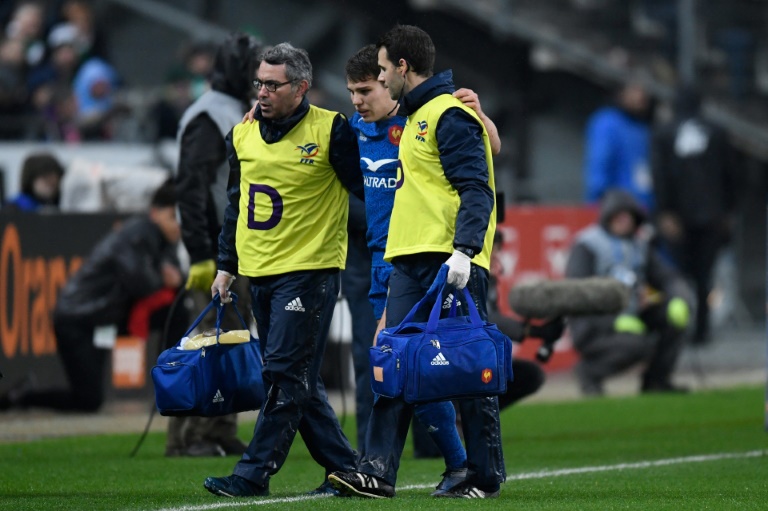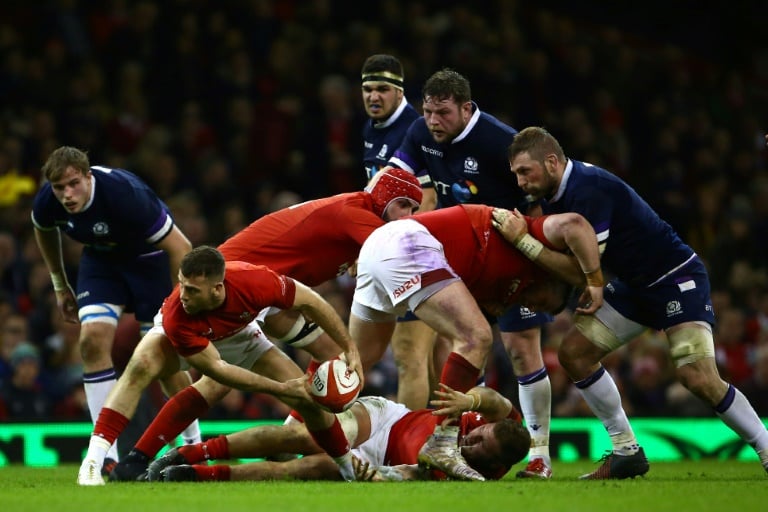Reigning champions England launched their Six Nations title defence with a 46-15 win away to Italy in Rome on Sunday to cap an exciting first weekend of the Championship.

Wales stopped Scotland’s recent revival in its tracks with a dominating 34-7 win in Cardiff on Saturday, a day when there was drama on and off the field in Paris before fly-half Jonathan Sexton’s last-ditch drop-goal saw Ireland edge France 15-13.
Below are the major talking points to come out of a lively start to the Six Nations:
France in fresh concussion row
Six Nations authorities were forced into reviewing their concussion protocols after France again faced accusations they had played fast and loose with the head injury assessment procedure designed to guard players against the dangers of concussion.
Both Matthieu Jalibert and Antoine Dupont were forced off during the match with knee injuries, yet both were recorded as head injury assessments. In the second case, it meant starting scrum-half Maxime Machenaud could return to the field in place of his initial replacement Dupont.

Six Nations authorities were forced into reviewing concussion protocols after France’s Matthieu Jalibert and Antoine Dupont (pictured) were forced off with knee injuries, recorded as head injury assessments
Had Dupont’s knee problem not been deemed a head injury — by an independent doctor according to France coach Jacques Brunel — it would have forced France to bring on wing Benjamin Fall instead of specialist scrum-half Machenaud, requiring a backline reorganisation at a crucial late stage of the game.
Controversy was avoided as Anthony Belleau took a late penalty instead of Machenaud, who had successfully kicked France’s first two penalties, and missed, allowing Sexton to win the match with the last kick of the game.
That didn’t satisfy retired Ireland great Brian O’Driscoll, though, who said on Twitter: “That HIA decision shouldn’t get swept under the carpet. It was nothing short of a disgrace!!!”
These incidents revived memories of a row during last season’s Six Nations when France got powerhouse front row Rabah Slimani into the action late on before eventually beating Wales in Paris.
The Welsh complained bitterly but, following a protracted inquiry, no disciplinary acton was taken against France by Six Nations chiefs.
Officials have now promised to look into Saturday’s events but it remains to be seen what, if any, action they take this time.
Wales prove Gatland right
Wales coach Warren Gatland has rarely lacked faith in his own ability or that of his teams.

Poor away form has proved Scotland’s Achilles heel in recent Six Nations, with coach Gregor Townsend admitting the showing against Wales was “miles below what we know we are capable of”
Having guided the British and Irish Lions to a 1-1 series draw against the world champion All Blacks, the native New Zealander returned to his day job of Wales boss and promptly told the chief executive of the Welsh Rugby Union that they would beat Scotland by 20 points.
Indeed but for Pete Horne’s last-ditch try, the Scots — who came into this tournament with high hopes — would have been ‘nilled’.
Poor away form has proved Scotland’s Achilles heel in recent Six Nations, with coach Gregor Townsend admitting Saturday’s showing was “miles below what we know we are capable of”.
Simmonds shows England’s strength in depth
During Wales’s 1970s golden age the joke was that then struggling border rivals England “would be dangerous if they got organised”.
Well the professional era has indeed seen England get their act together and further evidence they are now making the most of their vast playing resources came when Sam Simmonds marked his Six Nations debut with two of the title-holders’ seven tries against Italy.
Simmonds might not even have made the bench had Billy Vunipola, Nathan Hughes and Zach Mercer all been fit but the Exeter No.8 made his presence felt.
“He has so much gas, he does his speed work with the backs,” said England coach Eddie Jones.
Support Local Journalism
Add The Citizen as a Preferred Source on Google and follow us on Google News to see more of our trusted reporting in Google News and Top Stories.








